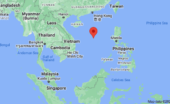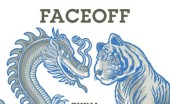Molly Minturn - My family is heartbroken to share that my father died in surgery on Monday, Feb. 10. It…
Wednesday Night #1313 Australia & Canada Comment
Written by Diana Thebaud Nicholson // May 2, 2007 // Australia, Canada, Cleo Paskal, Wednesday Nights // Comments Off on Wednesday Night #1313 Australia & Canada Comment
(Copyright National Post 2003)
Australia the next best thing to being at home
by Cleo Paskal
published Jan 25, 2003
AUSTRALIA – I love Canada. It is a special place. Unique. Grand. I have been known to grumble dangerously when mentions are made of the 51st state. But I have to admit I made a mistake. Canada is not quite as singular as I thought. We have a doppelganger. And it is not south of the border, it is south of the equator.
I had time and the bookshop in Sydney, Australia, had a section called “Australiana.” A natural match. I wandered over, expecting to have a chuckle at inevitable rows of ‘roo meat cookbooks. But before I could find any guides to bush tucker cuisine, I found myself picking up The Long Way Home: The Story of a Homes Kid. I was sure I had seen an almost identical book on British children immigrating to the colonies at a bookstore back home in Canada. I double checked.
Nope, this was definitely a kid who went to Australia.
One row down was It is no Secret: The story of a Stolen Child. It was about an aboriginal child taken from her family and “placed” with a white one. Sound familiar? How about The Navigators: The Great Race Between Matthew Flinders and Nicolas Baudin for the North-South Passage through Australia. Change North-South to North-West and you have a whole shelf of Canuck books.
Missing Newfoundland? Try reading The Road to Mount Buggery: A Journey through the Curiously Named Places of Australia (personally, I prefer Come By Chance to Mount Buggery but no disrespect meant to the Aussies). Think the biker wars are unique to Quebec? Not according to The Brotherhood: Inside the Outlaw Motorcycle Clubs. Missing the peace of prairie life? There is always The Olive Grove: An Exhilarating Account of Life on the Land. Or perhaps your tastes are for the high living. The Bronfmans have not done that badly compared with Rich Kids: How the Murdochs and Packers Lost $950 Million in One.Tel. And, if you want controversial war stories about how we colonials were done over by the English (always a popular topic), there is Shoot Straight, You Bastards: The Truth Behind the Killing of ‘Breaker’ Morant.
Sometimes, you travel halfway around the world and end up right back home.
Once you start looking, the parallels are everywhere. Australian public squares are littered with severe statues of severe Scotsmen, each more adventurous than the last. The difference being, in Ozland, they would come back almost dead from the heat rather than the cold. Not that they would dress much different in either country, if their effigies are anything to go by.
The new settlers made their money off the land (not their land, mind you). And they prospered. And they built. Grand Victorian limestone post offices, even grander train stations, planned cities and village greens. It is an alternate universe of certain parts of Canada. An alternate universe where you can swim in February. And in July. Hence the un-Canadian need for glorious amusement piers that thrust out into the warm ocean.
There are other areas where the parallels are not so clear. Our dangerous things can sensibly be seen from a distance. Their’s — snakes and other wrigglers — tend to be harder to spot.
Also, Australia was built off the backs of around 160,000 British convicts transported to Australia, many for such capital offences as “stealing curled hair.” Canada was sent convicts as well, but we were not as good at exploiting them. According to research done by the Hyde Parks Barracks Museum (one of the main detention centres for convicts in Sydney’s early days), in 1789, Cape Breton received Irish convicts who had been refused entry into Quebec. The convicts were “abandoned,” their fate unknown. A little later, an unknown number of Irish prisoners were sent to Nova Scotia once again. Haphazard supervision led to many making their way back home. Finally, the Brits seemed to give up entirely on using Canada as a prison colony and just used us as a semi-official halfway house. They sent “small parties” of “pardoned” juveniles from Parkhurst Prison, Isle of Wight, to New Brunswick disguised as free immigrants.
In fact, some Canadian convicts ended up in, yes, Australia. “Political prisoners” from the 1837-38 rebellions were sent from Quebec to Hobart. A replica of the ship that brought them, the H.M.S. Buffalo, is docked in Glenelg (got to love a country that has palindromes for its city names. Laval, anyone?). It is now a family fish restaurant.
Nearby is a monument to another bit of shared history: The ANZAC Plaza war memorial commemorates all the battles that the Australians (and, by extension, their co-colonials, the Canadians) have served in. It is not a patriotic flags-and-glory monument but a touching and subtle place of “healing and understanding.” There are six large boulders, each carved with a single word: silence, loss, sacrifice, respect, love and forgive. Hidden beneath the boulders are speakers that broadcast the voices of locals who have been touched by war; airmen, women workers, infantrymen, all tell their stories. The effect is deeply moving. And familiar. It reminds me of the humanity of many Canadian remembrances, where flag- waving is at a minimum and the true horror of war on a personal scale is commemorated.
If we have to admit that we are not all that unique, maybe Australia is not too bad a place to find our reflection.
More on the ANZAC Plaza war memorial
More on Hyde Park Barracks
More on Australia in general



